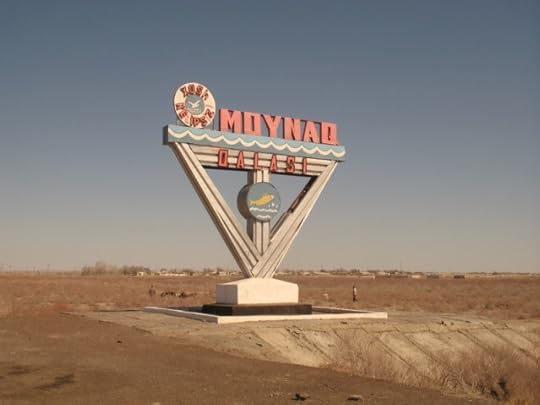Rick Harsch's Blog, page 8
February 19, 2016
Letters from Uzbekistan: What Arslan Shared with Stalin
Both Josip Vissarionovich and Arslan Levantine hung reproductions of Ilya Repin’s Reply of the Zaporozhian Cossacks to Sultan Mahmoud IV, which happened to be the favorite painting of both men.
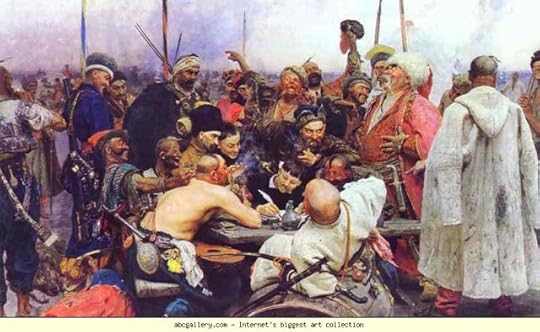
The painting depicts the Cossacks of nearer Dnieper to a Turkish Sultan’s demand that they submit to him. They had a letter writing party to refuse as insultingly as possible, heading the letter:
‘O Sultan, Turkish devil and spawn of devil and family, asslicker of Lucifer . What devil kind of fighter are you, who but one who at best can slay a hedgehog with your naked ass? The devil excretes, and your army eats. Ne, you scrotum scruffer, you will not make subjects of real horesemen. We do not fear women. Oh, and you unholy goatfucker, Ivan says you can go fuck your mother, as he himself has.’


February 12, 2016
Letters from Uzbekistan: Something Bizarre about the New Tsar

Arslan’s letter read something like this: ‘Our national cuisine remains the same over centuries (his English is pretty good here),’ and went on suggestively to say as I decoded it: ‘Putin’s grandfather was Stalin’s chef, and before that Lenin’s chef, and before that Rasputin’s chef!’ What was Arslan trying to tell me? This was the closest he had come to commenting on his heritage, and why when I typed in ‘Rasputin eating’ was this the only photo that came up?
Naturally I checked the information–and it’s true! Putin’s grandfather cooked for the last tsar, Rasputin, Lenin, and Stalin. What was Arslan trying to tell me? Should I cancel my flight?


February 8, 2016
Letters from Uzbekistan: Aral Sea Tours
Aral Sea Tours
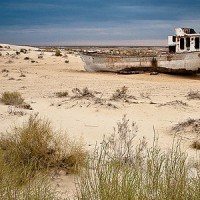
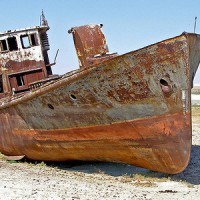
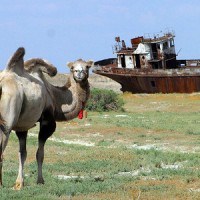
Aral Sea Tours and Travel Package
A full day excursion (a round trip of some 350 km) to Moynaq, former fishing community on the Aral Sea when water of the sea was at its normal old level. Here you will see the rusting remains of boats stuck in the sand where the sea used to be before its tragic shrinking in size. We offer Aral Sea tours with various travel options: short excursions, one day, multiple day tours and tours by air and by train.
Aral Sea Travel Tips
It is not so easy to get to the Aral Sea itself; it is a long and tough way through the desert. It is about 8 hours drive from Nukus to the Aral Sea. The challenging complexity of the Tour by off-road 4×4 vehicles makes it more attractive not only for ecologists, geologists, oilmen and journalists, but also for adventure seeking tourists.
Trying to get to the Aral Sea there without any guidance would not be a wise thing to do, because there is no real road and no road signs.
Trip to Aral Sea is one of those that enable each traveler to feel the human madness and miracles of nature, see the human power in the architectural monuments of Karakalpakstan and its soul in the paintings kept in Savitsky Museum. The landscape Aral Sea is interesting, especially bearing in mind that you are walking on what used to be the bottom of the sea. There are sea shells all over the ground and dry sea plants. The places around are hilly and plain, as it is a desert place. But it is beautiful to see.
The dying Aral Sea with graveyard of abandoned ships, deserted settlements of fishermen, tombs of old Massaget tribes, over 1000 archaeological monuments and mirages in the steppe – these are what you see and experience with one of our Aral Sea Tour packages.


February 4, 2016
Letters from Uzbekistan: The Aral Assignment
Let this serve as an introduction to the next post. Arslan Levantinov of the Uzbekistani tourist bureau was given the assignment to make of the Aral disaster a tourist attraction. As he lives in Tashkent, of course, this seems to be a sign of the discontent of his superiors, but that may be an anachronistic Soviet era cryptological impulse of my own. The fact is, however, that I know that Mr. Levantinov has a great fear of travel and it is quite unlikely that he had the least desire to take on this project. What he fears more than travel, however, is getting burned–and a man in Tashkent certainly risks getting burned, at least by the son, at some point during the long journey to the Uzbeki wastes that were once the Aral sea. Yet he pulled off a masterpiece of travel bureau writing. The likelihood that he did so without leaving his apartment in Tashkent is neither here nor there, especially if there is Karakalpakstan, particularly the once coastal city of ‘Muynak’ (pardon my Cyrillophobia).


January 24, 2016
Letter from Uzbekistan: THE VANISHING ARAL SEA

About half of that sea is ‘in’ Uzbekistan, which gets the worst of the health hazards, as toxic dust from the former seabed mostly flies south to the province of Karakalpakstan.
The story of the Aral is rather simple. It was fed by the Syr Darya and the Amu Darya, both of which were siphoned from for irrigation extensively during the Soviet era, so that eventually no water at all from either river fed the sea. The balance of the Aral was precarious enough, fed rather weakly, evaporating at roughly the rate it was fed. But it was a great place for sturgeon and a number of other interesting sea creatures.
Soon we shall sea how a tourism functionary makes the best of this rather sad, seemingly uninviting region.


January 18, 2016
Letters from Uzbekistan


My curiosity incited by correspondence with the aforementioned Arslan Levantinov, he middling bureaucrat detained by fate in a country that boils its citizens alive at the same time he has a particular fear of being burnt that stems from a childhood accident at a stove, I thought I might start by checking Wikileaks–I know. it’s hard to take an organization with such a Lewis Carrolesque title seriously, yet what follows is a genuine document regarding tortures that include those Mr. Levantinov most fears:
(As will virtually all to do with Uzbekistan, comedy persists, here commencing with ‘The report includes recommendations to the government of Uzbekistan to end
torture, and urges the Uzbek government to:’
We must assume many a belly laugh at this point among the official readerrs of the document, imagining the fox baby-sitting the hen house instructed to be sure lights out and quiet by 7:30 p.m.)
Uzbekistan: Torture Endemic to Criminal Justice System
For Immediate Release
Uzbekistan: Torture Endemic to Criminal Justice System
UN Committee Should Press Tashkent to Publicly Condemn and End the Use of
Torture
(Geneva, November 7, 2007) – Uzbekistan’s government continues to allow
torture and ill-treatment in the criminal justice system without holding
perpetrators accountable, Human Rights Watch said in a report released
today.
Uzbekistan’s record is coming up for scrutiny before the United Nations
Committee Against Torture (CAT) on November 9, 2007. November also marks
the five-year anniversary of the visit to Uzbekistan by the UN Special
Rapporteur on torture, who concluded that torture in Uzbekistan was
“systematic.”
The 90-page report, “Nowhere to Turn: Torture and Ill-Treatment in
Uzbekistan,” documents widespread torture that goes largely unpunished.
The report finds that torture and ill-treatment are ignored and overlooked
by investigators, prosecutors, and judges, and generally hushed up by the
media and the government.
“Uzbekistan wants to make its multilateral partners believe that it has
put an end to torture,” said Holly Cartner, Human Rights Watch’s Europe
and Central Asia director. “But official statements simply don’t square
with reality.”
The report details the cycle of abuse that starts at the time of an
individual’s detention and continues through conviction or beyond to
compel confessions or other testimony. In cases documented by Human Rights
Watch, police agents manipulated and prevented detainees from having
access to counsel of their choice. They beat, kicked and threatened
detainees soon after they were first detained, when detainees are cut off
from access to third parties or avenues where they might seek redress.
Police and security agents abuse detainees and threaten witnesses,
detainees’ families, and sometimes even lawyers to deter them from
pursuing accountability.
“This is no marginal problem,” said Cartner. “The Committee Against
Torture needs to recognize that ill-treatment in Uzbekistan is endemic to
the criminal justice system and not just a problem caused by a handful of
rogues.”
While the Uzbek government has given examples of police held accountable
for torture, no one was held accountable in the cases documented by Human
Rights Watch. Judges did not investigate torture allegations that criminal
defendants made in court testimony, and instead alleged that the
defendants were lying or told them they should have filed a complaint
during the investigation. A 39-year old defendant in one of the trials
monitored by Human Rights Watch explained why he could not do this: “I
never had a confidential meeting with a lawyer. I know that the pressure
would have increased if I had complained. I am a human being. I am not
made of iron. Even animals scream when you beat them. I was scared. That
is why I did not complain.”
Common methods of torture and ill-treatment include beatings with
truncheons and bottles filled with water, electric shock, asphyxiation
with plastic bags and gas masks, sexual humiliation, and threats of
physical harm to relatives.
The report includes recommendations to the government of Uzbekistan to end
torture, and urges the Uzbek government to:
. Take immediate and concrete steps to comply with its obligations
under the Convention against Torture and other Cruel, Inhuman or Degrading
Treatment or Punishment;
. Implement in full the February 2003 recommendations issued by the
UN Special Rapporteur on torture following his visit to Uzbekistan;
. Publicly acknowledge the scale of torture in Uzbekistan;
. Conduct a robust, nationwide investigation into the practice of
ill-treatment and torture;
. Declare what measures it will be taking to ensure the prohibition
on torture and other ill-treatment is fully enforced and respected in
practice;
. Make this information available and accessible to the local
population, through the media and other appropriate forums;
. Ensure that detainees are informed of their rights, that they have
access to confidential meetings with a lawyer of choice, and can
communicate unimpeded with their lawyer at trial; and,
. Hold perpetrators of torture and ill treatment accountable to the
full extent of the law and ensure that detainees can make complaints about
torture without fearing retribution.
The report also calls on the Committee Against Torture to make full use of
the opportunity provided by its review to express concern about the
continuing widespread use of torture in Uzbekistan, and to call on the
authorities at the highest level to publicly condemn the use of torture.
The committee should also emphasize the crucial role played by civil
society groups, independent media and international organizations in
efforts to combat torture and ill-treatment, and call on the government to
ensure that these actors are able to function freely and effectively in
Uzbekistan.
Human Rights Watch also called on the international community to support
the work of the UN’s anti-torture bodies by advancing the implementation
of their recommendations as part of their relations with the Uzbek
government.
“International actors should take a principled stance and make ending the
use of torture a key component of any dialogue with the government of
Uzbekistan,” said Cartner.
To view the Human Rights Watch report, “Nowhere to Turn: Torture and
Ill-treatment in Uzbekistan,” please visit:
http://hrw.org/reports/2007/uzbekistan1107/
For audio testimony by Uzbek citizens who were tortured in detention (with
English translation and voicing), please visit:
http://hrw.org/audio/2007/english/uzbekistan11/uzbeki17229.htm
For more information, please contact:
In Geneva, Andrea Berg (English, German, Russian): +44-163-760-9963
(mobile)
In Geneva, Veronika Szente Goldston (English, Finnish, Swedish, Hungarian,
French): +1-917-582-1271 (mobile)


January 5, 2016
O Trinkova
Chapter 26 O Trinkova
In English we would call you Ivan Trinko Street
But you deserve better.
We don’t want people asking us who you were, Mr. Trinko,
For even though you were a Roman Catholic priest, A poet, a writer, a philosopher, a translator, a
linguist, a critic, a composer–
Not to mention a painter–
When I asked a poet about you she said
‘It doesn’t matter.’
Maybe you did too much.
Let us look at the benighted beginning of your street:
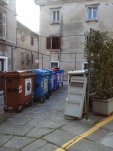
I made the picture small as if I were your grandchild
And I loved you
Because where a triangle of freedom opened up on Gregorčičeva
Where you were interesting
Going two directions at once
Perhaps a poet flank past that little round sign
And a philosopher flank to the left that takes us down close to the sea
Where you had your opportunity they put a garbage kennel
You deserved better.
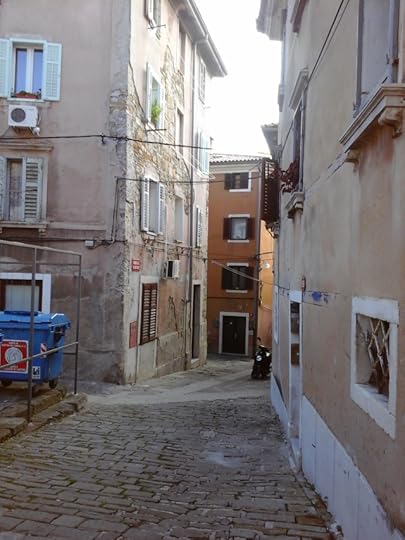
Down you go! Go, Ivan, go!
Unless you need to stop first to dump your garbage
Or hop on your motorcycle and come back up.
As you know, translators go both ways
And critics sometimes have to escape in haste
You might need to zip up to the church that is so near, just one short street behind the camera man
You never were a camera man, yet, still, Ivan, you deserved better.
Your opportunity to make your mark as a street poet in Izola
Is evident in the photo to my right
A surprise move 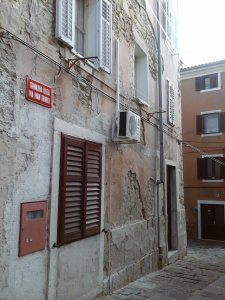
A different Trinko
Classic, decadent, historic, jaded
Exuding all the charm inherent in an old
Venezian city
Look how the building itself stumbles down
Your lane!
But is there an uglier building in the old town than that drek brown stump before you?
No: wait! Have you tricked me, philosopher-poet?
Or are you a swine who would have a segment of Gramsci’s street
To make up for what is lacking in your own?
No, Ivan, you have no side street, you merely descend
Belatedly,
And rapidly,
Gracelessly,
You would have us pick up speed, only to zig, to zag, pick up more speed
And then run smack into a wall!
We deserved better.
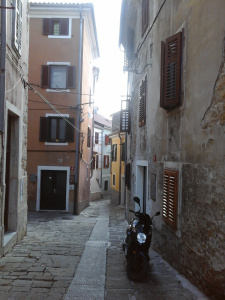
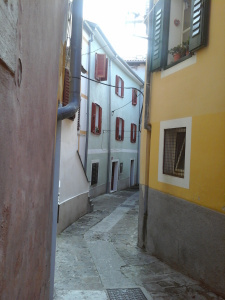
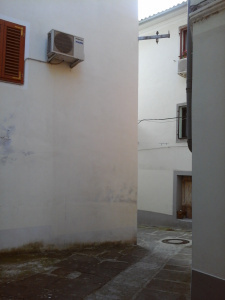
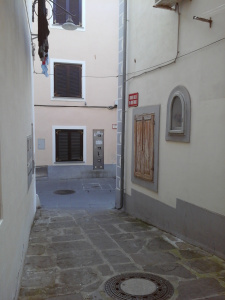


January 1, 2016
Letters From Uzbekistan

I suppose it’s not unusual for people to be trapped in a context that keeps them in perpetual proximity to the realization of their fears, so let us not ‘grieve’ prematurely over the continuing (after all) life of, yes, here I can name him, Arslan Levantinov, who as a young child burned his hand on a stove in a fit of arch curiosity–it was the arching belly of the black coal burning stove that invited him to curl his hand in the most natural way and press the source of the intoxicating heat. This in itself is nothing until I add that this happened in Tashkent, in Uzbekistan, his home country, where he works for a government tourist agency, a minor functionary–in Uzbekistan, beloved of successive US governments for its peace and geologic fortunes, perhaps most of all for its endorrheics (never mind that for now, as there is much to say about it and I will get to it later, as will Mr. Levantinov in one of his letters, which include a joke of the type I really like, in which the reader is invited to contemplate rather be snared by a punch-line [“What is endorrhea?” he asks. “The combination of violent diarrhea with implacable constipation” {for now, my phrasing}])…In Uzbekistan; and no country, of course, is without its struggles, just as no country is without the native soups of their cuisines–here is the ugly payoff: in Uzbekistan, people are taken from the streets and put into large pots and boiled alive.
Our Arslan Levantinov, encavmaphobic (there should really be no name for a universal fear, but for Arslan the fear is apparently more agitating than for most), lives in fear of making some kind of error on his own part, or of some kind of mistake being made by the authorities, or fear of the authorities–here I think we nail the entire phenomenon well down–for no traceable reason putting a hood over his head (there are many names for this phobia; I think fear of fog, though, is most poetic and most accurate–homichlophobia [one hears a by now ancient German cry of terror: “Nein! Nein! Nicht der Nebel!” for what is need of night in such a fog?])–and, well, in need here of some quaint, using him as the first ingredient in a pot of the national soup.


December 21, 2015
Bonobos Flee Slovenia en Masse after Gay Marriage Referendum
 Slovenia, which had the largest collection of bonobo monkeys in Europe until now was unprepared for the mass breakout from the Ljubljana and Škofija Loka zoos last night after the results of the gay marriage referendum came in at nearly 2 to 1 against, with over 60% of the population abstaining. The tollway was closed from 11 pm until 5 am as the 1000 plus apes gathered near Logatec for the group romp toward the border fence at Dragonja, which they scaled like so many wily Syrians. Although Croatian authorities had been alerted, they were unprepared to deal with the number, strength and diversionary strategies of these smartest and most sexually active of simians. A spokesman from Škofija Loka, the only man in Slovenia who speaks bonobo, said plans for an escape had been in the works for some time, as these omnisexual beasts feared that the logical next step was to prevent g-g rubbing (two female apes rubbing genitalia, a favorite bonobo practice, for females) in front of children, who, a bonobo spokesman pointed out, were never invited by them to watch. ‘When they brought us here they just said act natural, so we have been.’ Another bonobo practice that has had the church up in arms is that of greeting each other by fornicating. ‘What better way to say hello,’ the spokesape said, and the translator concurred. ‘When a bonobo says hello, you can be sure it’s sincere.’
Slovenia, which had the largest collection of bonobo monkeys in Europe until now was unprepared for the mass breakout from the Ljubljana and Škofija Loka zoos last night after the results of the gay marriage referendum came in at nearly 2 to 1 against, with over 60% of the population abstaining. The tollway was closed from 11 pm until 5 am as the 1000 plus apes gathered near Logatec for the group romp toward the border fence at Dragonja, which they scaled like so many wily Syrians. Although Croatian authorities had been alerted, they were unprepared to deal with the number, strength and diversionary strategies of these smartest and most sexually active of simians. A spokesman from Škofija Loka, the only man in Slovenia who speaks bonobo, said plans for an escape had been in the works for some time, as these omnisexual beasts feared that the logical next step was to prevent g-g rubbing (two female apes rubbing genitalia, a favorite bonobo practice, for females) in front of children, who, a bonobo spokesman pointed out, were never invited by them to watch. ‘When they brought us here they just said act natural, so we have been.’ Another bonobo practice that has had the church up in arms is that of greeting each other by fornicating. ‘What better way to say hello,’ the spokesape said, and the translator concurred. ‘When a bonobo says hello, you can be sure it’s sincere.’
One human gay couple, who wished to remain anonymous, were interviewed and expressed concern that two more places where gay people were welcome in Slovenia would now be shut down. ‘And now that the translator has been arrested on suspicion of bestiality, who knows what’s next?’
Officer Loyze Škrobnik of the highway patrol said that the apes were remarkable orderly, with few exceptions. ‘It struck me as a sort of planned panic. Most of them stuck to the center line and southbound, but groups of up to fifty or more were on the wrong side, many having been confused by the Postojna ‘crossroads’. ‘Anyway, from what I was told, they frequently tend to cross over.’ Few cars were damaged and no humans injured. But it was necessary to close the highway.
These shit tossers, beloved of children, the third greatest tourist attraction in Slovenia after Lake Bled and the killing squares of Celje, are unlikely to be persuaded to return. ‘Every last one is gone,’ the translator said, arms behind his back, handcuffed. ‘I was told that such a referendum in the past has always led to a resurgence of so-called family and church values, and even though Slovenes are called Catholic despite the fact that fewer than 10% actually follow Catholic practices, they were taking no chances.’ Some had been captured in Uganda, many volunteering to travel to what they thought was a free country.
Only a dozen of the apes is in custody in Croatia, at a holding pen in Pazin. They were caught in pairs, having stopped to fornicate or g-g rub (eight females and four males, according to our sources).
Church officials responded with a shrug. ‘Good riddance to bad rubbing. Now maybe our young people will keep their hands out of their pants until the church has had time to instil appropriate manners into them. That is, after marriage, and by marriage we mean one male and one female, unpregnant. If necessary, we will have representatives of the Bishopric of Salzburg come down here to straighten people out.’
Croatian and Slovene authorities working together have asked the public to keep an eye out for these ringleaders:



December 16, 2015
Conning the Emotions, part one
Can you get this monkey’s message?

What about this one? What is the polar bear conveying?

And this puppy?

If you get even one of these wrong, chances are you have been emoticonned.
More on this phenomenon soon.



